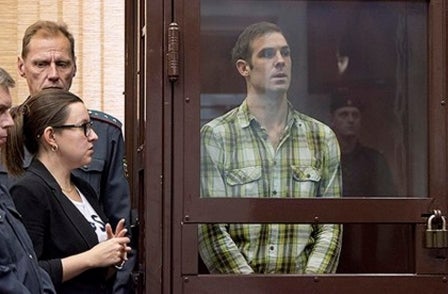
Russia has not appeared at an international court hearing surrounding the jailing of British journalist Kieron Bryan and a group of Greenpeace activists.
Bryan was taken into custody on 18 September after the vessel he was aboard Arctic Sunrise was raided by Russian special forces.
Bryan had been hired by Greenpeace to cover a protest by the environmental pressure group against attempts by Russia to drill for oil and gas in the Arctic Circle.
The Netherlands government has petitioned the International Tribunal for the Law of the Sea because for a ruling about the legality of Russia’s actions.
Greenpeace maintain that they were engaged in a peaceful protest and their vessel had been in international territorial waters when it was seized.
Netherlands representative Liesbeth Lijnzaad told the Hamburg based court that they should proceed with the hearing despite the Russian no-show.
The tribunal handles disputes related to the 1982 UN convention on the Law of the Sea.
It is understood that Bryan the 29 others are being transferred from the port city of Murmansk to St Petersburg where they continue to face ‘hooliganism’ charges.
Initially the group was charged with piracy which carries a 15 year jail term. However the lesser charges of hooliganism could still see Bryan and his fellow shipmates detained for more than seven years.
Last Saturday a group of supporters of the jailed journalist handed in a petition with more than 1,400 names to the Russian Embassy in London.
The Foreign Office has intervened on Bryan’s behalf seeking his release.

Lawyers representing the Netherlands have argued that Russia violated UN regulations when it seized the Greenpeace ship Arctic Sunrise and charged those on board with piracy.
Russia argued that even though it had ratified the 1982 UN Convention on the Law of the Sea, it stipulated it would not accept arbitration on cases it considered to be matters of national sovereignty.
Dutch lawyers asked for the immediate release of 28 Greenpeace activists, a Russian photographer and a British videographer, as well as the Arctic Sunrise icebreaker. All were seized by the Russian coastguard after a protest near an oil rig owned by Russian state energy firm Gazprom in the Arctic on 18 September.
The Dutch argued there was no evidence of piracy and that the Russians had no valid reason to board the vessel without permission, therefore committing an "internationally wrongful act". All moves that followed, like transferring the ship to Russian waters and arresting those on board, were also "internationally wrongful", they said.
Russia's main investigative agency said two weeks ago it had dropped the piracy charges against the jailed activists and replaced them with hooliganism charges – meaning a maximum possible seven-year sentence instead of 15 years.
At the same time Russia warned it could also file additional charges, including violence against authorities, which carries up to 10 years in prison.
Greenpeace, however, says its lawyers have not yet been formally notified by Russia that the piracy charges have been dropped.
"Russian authorities propose to jail 30 men and women for two decades because a couple of peaceful protesters tried to hang a small yellow banner from the side of a 500,000-ton oil platform," Greenpeace International executive director Kumi Naidoo said in a statement after the hearing.
The Hamburg tribunal was formed after the UN Convention on the Law of the Sea came into force in 1994 to adjudicate maritime disputes. The court will first have to decide if it has jurisdiction in the case – Russia insists it does not – then decide on the arguments advanced by the Netherlands.
The court expects to issue its ruling on 22 November.
Email pged@pressgazette.co.uk to point out mistakes, provide story tips or send in a letter for publication on our "Letters Page" blog
